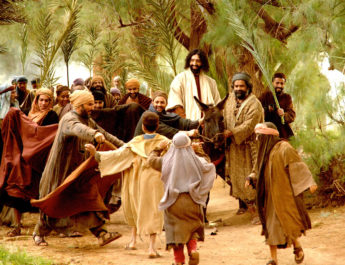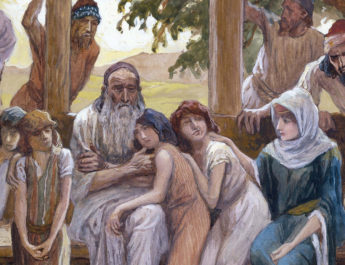Matthew 25:31-46
New Year’s Day ABC
31 “When the SonA of ManB comesC in his gloryD
A “Son” = huios. This is son, descendant – a son whether natural born or adopted. It can be used figuratively for other forms of kinship.
B “Man” = anthropos. Probably from aner (man, male, husband) + ops (eye, face); {from optanomai (to appear, be seen); perhaps from horao (become, seem, appear)}. This is human, humankind. Used for all genders.
C “comes” = erchomai. This is to come or go.
D “glory” = doxa. From dokeo (to have an opinion, seem, appear, suppose; a personal judgment; to think); from dokos (opinion). This is literally something that evokes a good opinion – something that connects to our understanding of intrinsic worth. The ultimate expression of this is, of course, God and God’s manifestation. So, this is opinion, honor, and dignity, but also praise, glory, renown, and worship.
and allE the angelsF with him, then he will sitG on the throneH of his glory.
E “all” = pas. This is all or every.
F “angels” = aggelos. Probably from ago (to lead, bring, carry, guide) + agele (flock, herd, drove); {also from ago (see above)}. This is angel or messenger. Properly, it is one sent with news or to perform a specific task. This messenger can be human or an angel from heaven. More commonly, it is used for angels in the New Testament.
G “sit” = kathizo. From kathezomai (to sit down, be seated); {from kata (down, against, according to, among) + hezomai (to sit); {from aphedron (a seat, a base)}}. This is to sit, set, appoint, stay, rest.
H “throne” = thronos. Probably from thanos (bench); from thrao (to sit). This is throne or seat – the place where the king sits. So, it is used figuratively to mean power, dominion, or a potentate. This is where the word “throne” comes from.
32 All the nationsI will be gatheredJ before him, and he will separateK peopleL
I “nations” = ethnos. Probably from etho (a custom or culture). This is people who are united by having similar customs or culture. Generally, it is used to refer to Gentiles. This is a tribe, race, nation, or Gentiles in general. This is where the term “ethnicity” comes from.
J “gathered” = sunago. Related to “angels” in v31. From sun (with, together with, closely associated) + ago (see note F above). This is to lead together and so to assemble, bring together, welcome with hospitality, or entertain. In the sense of assembly, this is the root of the word “synagogue.”
K “separate” = aphorizo. 10x in NT. From apo (from, away from) + horizo (to determine, set boundaries, appoint, designate, pre-determined; literally, this is setting horizons); {from the same as horion (boundary, territory); from horos (limit, boundary)}. This is to set off by a boundary – to divide, separate, exclude. It can also mean ostracize or keep aloof.
L “people” = autos. Literally, “them.”
one from anotherM as a shepherdN separates the sheepO from the goats,P
M “another” = allelon. From allos (other, different, another; this is one more of the same kind or a similar type). So, this is each, another, together, or mutual. There is a different word in Greek that speaks of another as a different kind (heteros).
N “shepherd” = poimen. 18x in NT. This is shepherd or pastor – one who protects. It is also used figuratively to mean ruler.
O “sheep” = probaton. Probably from probaino (to go forward literally or to advance in years); {from pro (before, ahead, earlier than, above) + the same as basis (a step, pace, foot); {from baino (to walk, to go)}}. This is literally easily led and so a sheep or another grazing animal. Also use figuratively of people who are led easily.
P “goats” = eriphos. 2x in NT– here and in Luke 15:29 as the goat that the elder son wants for a party in the parable of the prodigal son. Perhaps from the same as erion (wool); from eiros (wool). This comes from the root in the sense of hairiness – a kid or male goat.
33 and he will putQ theR sheep at his right handS and the goatsT at the left.U
Q “put” = histemi. This is to stand, place, establish, appoint, stand ready, be steadfast.
R {untranslated} = men. This is truly, indeed, even, in fact. Often, it is not translated, but used to emphasize affirmation.
S “right hand” = dexios. Perhaps from dechomai (to warmly receive, be ready for what is offered, take, accept, or welcome; to receive in a literal or figurative sense). This is right, right side, or the right hand.
T “goats” = eriphion. Related to “goats” in v32. 1x in NT. From eriphos (see note P above). This is a kid, a young goat.
U “left” = euonumos. 9x in NT. From eu (good, well, rightly) + onoma (name, authority, cause, character, fame, reputation; thought to include something of the essence of the person and not separate from the person); {may be from ginosko (know, recognize, learn from firsthand experience)}. This is literally well-named or of a good name. It refers to the left or left side.
34 Then the kingV will sayW to those at his right hand, ‘Come,X you who are blessedY
V “king” = basileus. Related to “sheep” in v32. Probably from basis (see note O above). This is king, emperor, or sovereign.
W “say” = ereo. Perhaps from rheo (to say, speak of, command). This is to say, tell, speak, mean, command.
X “come” = deute. 12x in NT. From deuro (come here, hither, hence, now, until now). This is come, follow – as an exclamatory mood.
Y “blessed” = eulogeo. Related to “left” in v33. From eu (see note U above) + logos (word, statement, speech, analogy; a word that carries an idea or expresses a thought, a saying; a person with a message or reasoning laid out in words; by implication, a topic, line of reasoning, or a motive; can be used for a divine utterance or as Word – Christ); {from lego (to speak, tell, mention)}. Properly, this is speaking well of – speaking so that the other is benefited. It can mean praise, bless, thank, or call for a blessing. This is where “eulogy” comes from.
by my Father,Z inheritAA the kingdomBB
Z “Father” = pater. This is father in a literal or figurative sense. Could be elder, senior, ancestor, originator, or patriarch.
AA “inherit” = kleronomeo. 18x in NT. From kleronomos (heir); {from kleros (lot, portion, heritage; that share assigned to you; also a lot used to determine something by fate, chance, or divine will); {perhaps from klero (casting a lot) or from klao (to break in pieces as one breaks bread)} + the same as nomos (what is assigned – usage, law, custom, principle; used for the law in general or of God’s law; sometimes used to refer to the first five books of the Bible or the entire Old Testament; also used to refer to theology or the practice and tradition of interpreting and implementing the law of God); {from nemo (to parcel out, assign)}}. This is to acquire or get by inheriting.
BB “kingdom” = basileia. Related to “sheep” in v32 & “king” in v34. From basileus (see note V above). This is kingdom, rule, authority, sovereignty, royalty, a realm.
preparedCC for you from the foundationDD of the world,EE
CC “prepared” = hetoimazo. From hetoimos (make ready, be ready because of being prepared, standing by, adjusted; ready to meet some opportunity or challenge). This is to prepare or provide.
DD “foundation” = katabole. 11x in NT. From kataballo (to cast down, lay prostate, set a foundation); {from kata (down, against, throughout, among) + ballo (to throw, cast, place, put, drop)}. This is a foundation or a plan for one – setting the foundation according to the plans. Figuratively, it can be the beginning of something, sowing, or conception.
EE “world” = kosmos. Perhaps from the base of komizo (to carry, convey, recover); from komeo (to take care of). This is order, the world, the universe, including its inhabitants. Literally, this is something that is ordered so it can refer to all creation. It can also refer to decoration in the sense that something is better ordered and, thus, made more beautiful. This is where “cosmos” and “cosmetics” come from.
35 for I was hungryFF and you gaveGG me food,HH I was thirstyII and you gave me something to drink,JJ
FF “was hungry” = peinao. From peina (hunger); related to penomai (working for a living; laborer, poor person; to work for daily bread); from peno (to toil to survive day by day). This is to hunger, be needy, or desire earnestly. It can be being famished in a definitive sense or in comparison to someone or something else. Figuratively, this means to crave.
GG “gave” = didomi. To give, offer, place, bestow, deliver. This is give in a literal or figurative sense.
HH “food” = phago. This is to eat or figuratively to consume like rust does.
II “was thirsty” = dipsao. 16x in NT. From dipsa (thirst); from dipsos (thirst). This is thirst in a literal or figurative sense. Can also mean keenly desire.
JJ “gave…something to drink” = potizo. 15x in NT. From potos (drink or for drinking) OR from pino (to drink literally or figuratively). This is to give to drink, water, furnish, irrigate, or feed.
I wasKK a strangerLL and you welcomedMM me, 36 I was nakedNN and you gave me clothing,OO
KK “was” = eimi. This is to be, exist.
LL “stranger” = xenos. 14x in NT. This is foreign or foreigner, an alien or guest. It could also be something new, novel, or strange. This is where the word “xenophobia” comes from.
MM “welcomed” = sunago. Same as “gathered” in v32. See note J above.
NN “naked” = gumnos. 15x in NT. This is naked. Generally, it refers to someone who is not completely clothed i.e. only wearing the undergarment and not the complete attire for going out. Rarely, it can mean completely naked. It can be naked in a literal or figurative sense – open, bare, ill-clad. This is where “gymnasium” comes from.
OO “gave…clothing” = periballo. Related to “foundation” in v34. From peri (about, concerning, all around, encompassing) + ballo (see note DD above). This is to thrown around, clothe, array, put on.
I was sickPP and you took care ofQQ me, I was in prisonRR and you visitedSS me.’
PP “was sick” = astheneo. From asthenes (not having strength or weak in a moral sense; sick); {from a (not) + sthenes (strong, vigor); {from the base of sthenoo (to strengthen so that one can be mobile); from sthenos (strength)}}. This is sick, feeble, languishing, impotent. Can also refer to moral weakness.
QQ “took care of” = episkeptomai. 11x in NT. From epi (on, upon, at, what is fitting) + the base of skopos (a mark or goal like the marker at the end of a race; figuratively, other goals or destinations; also, a watch or sentry); {from skeptomai (to peer out, consider, gaze carefully); perhaps related to skapto (to dig or excavate)}. This is to look at, look out for, see, select, visit.
RR “prison” = phulake. From phulasso (to guard something so that it doesn’t escape – to watch over it vigilantly; being on guard in a literal or figurative sense); related to phulaks (military guard, sentry, watcher). This is the act of guarding, the person who guards, the place where guarding occurs (i.e. a prison), or the times of guarding (the various watches).
SS “visited” = erchomai. Same as “comes” in v31. See C note above.
37 Then the righteousTT will answerUU him,VV
TT “righteous” = dikaios. From dike (the principle of justice; that which is right in a way that is very clear; a decision or the execution of that decision; originally, this word was for custom or usage; evolved to include the process of law, judicial hearing, execution of sentence, penalty, and even vengeance; more commonly, it refers to what is right); may be from deiknumi (to show, point out, exhibit; figurative for teach, demonstrate, make known). This is correct, righteous, just, or a righteous person. It implies innocent or conforming to God’s standard of justice.
UU “answer” = apokrinomai. From apo (from, away from) + krino (to judge, decide, think good, condemn, determine, pass judgment, stand trial, sue; judging whether in court or in a private setting; properly, mentally separating or distinguishing an issue – to come to a choice or decision, to judge positively or negatively in seeking what is right or wrong, who is innocent or guilty; can imply trying, condemning, punishing, or avenging). This is to reply or respond, to draw one’s own conclusions, to speak when one is expected to.
VV {untranslated} = lego. Related to “blessed” in v34. See note Y above.
‘Lord,WW when was it that we sawXX you hungry and gave you foodYY or thirsty and gave you something to drink? 38 And when was it that we saw you a stranger and welcomed you or naked and gave you clothing? 39 And when was it that we saw you sick or in prison and visited you?’
WW “Lord” = Kurios. From kuros (authority, supremacy). This is a respectful address meaning master or sir. It refers to one who has control or power greater than one’s own. So, it was also applied to God and Jesus as Master or Lord.
XX “saw” = horao. Related to “Man” in v31. See note B above.
YY “gave…food” = trepho. 9x in NT. Perhaps from trope (turning, shifting, a revolution; figuratively, a variation). This is to bring up, rear, nourish, fatten, nurse. Properly, it is to enlarge through proper nourishment.
40 And the king will answer them,ZZ ‘TrulyAAA I tellBBB you,
ZZ {untranslated} = ereo. Same as “say” in v34. See note W above.
AAA “truly” = amen. From Hebrew amen (verily, truly, amen, truth, so be it, faithfulness); from aman (to believe, endure, fulfill, confirm, support, be faithful, put one’s trust in, be steadfast. Figuratively, this is to be firm, steadfast, or faithful, trusting, believing, being permanent, morally solid). This word is literally firmness, but figuratively fidelity, faithfulness, honesty, responsibility, trust, truth, steadfastness. Properly, it is to be sure, certain, or firm. This is a word of emphasis indicating that something crucial follows.
BBB “tell” = lego. Same as {untranslated} in v37. See note VV above.
just as you didCCC it to oneDDD of the leastEEE of these brothersFFF and sisters of mine, you did it to me.’
CCC “did” = poieo. This is to make, do, act, construct, abide, or cause.
DDD “one” = heis. This is one, a person, only, some.
EEE “least” = elachistos. 13x in NT. From elachus (short); used as a superlative for mikros (small). This is smallest or littlest in the sense of size, amount, rank, dignity, and so on.
FFF “brothers” = adelphos. From a (with, community, fellowship) + delphus (womb). This is a brother in a literal or figurative sense. It is also used of another member of the Church.
41 Then he will say to those at his left hand, ‘You who are accursed,GGG departHHH from me into the eternalIII fireJJJ prepared for the devilKKK and his angels,
GGG “are accursed” = kataraomai. 6x in NT. From katara (curse, accursed; a curse as penalty); {from kata (down, against, throughout, among) + ara (prayer, curse, imprecation; a pray for evil); {probably from airo (raise, take up, lift, remove)}}. This is to curse, execrate, doom.
HHH “depart” = poreuomai. From poros (ford, passageway). This is to go, travel, journey, or die. It refers to transporting things from one place to another and focuses on the personal significance of the destination.
III “eternal” = aionios. From aion (an age, length of time); from the same as aei (ever, always, unceasingly, perpetually; on every occasion). This is age-long, forever, everlasting. Properly, that which lasts for an age. This is where eon comes from.
JJJ “fire” = pur. This is fire, lightning, heat from the sun. Figuratively, it can refer to strife or trials.
KKK “devil” = diabolos. Related to “foundation” in v34 & “gave…clothing” in v36. From diaballo (laying a charge against someone, generally with hostility; literally, to thrust through or cast back and forth– used for slandering, accusing, or gossiping; whether or not the sentiment is true, it is spread with negative intention); {from dia (through, across, because of, thoroughly) + ballo (see note DD above)}. This is a properly a slanderer or someone who accuses falsely – criticizing unfairly with the intent to cause harm or damage character. This can also mean backbiter or malicious gossip. Also, the Slanderer, the Devil.
42 for I was hungry and you gaveLLL me no food, I was thirsty and you gave me nothing to drink, 43 I was a stranger and you did not welcome me, naked and you did not give me clothing, sickMMM and in prison and you did not visitNNN me.’
44 Then they also will answer,OOO ‘Lord, when was it that we saw you hungry or thirsty or a stranger or naked or sickPPP or in prison and did not take care ofQQQ you?’
LLL “gave” = didomi. Same as “gave” in v35. See note GG above.
MMM “sick” = asthenes. Related to “was sick” in v36. See note PP above.
NNN “visit” = episkeptomai. Same as “took care of” in v36. See note QQ above.
OOO {untranslated} = lego. Same as {untranslated} in v37. See note VV above.
PPP “sick” = asthenes. Same as “sick” in v43. See note MMM above.
QQQ “take care of” = diakoneo. From diakonos (servant, minister, waiter, or attendant; a person who performs a service, including religious service); {perhaps from dia (through, across to the other side, thoroughly) + konis (dust) OR from dioko (to chase after, put to flight; by implication, to persecute or to purse like a hunter after its prey; this can be earnestly pursue or zealously persecute); {related to dio (put to flight)}}. This is to wait at table, to serve generally, to minister or administer, to be in the office of deacon. To wait on someone as a slave, friend, or host.
45 Then he will answer them,RRR ‘Truly I tell you, just as you did not do it to one of the least of these, you did not do it to me.’ 46 And these will go awaySSS into eternal punishmentTTT but the righteous into eternal life.”UUU
RRR {untranslated} = lego. Same as {untranslated} in v37. See note VV above.
SSS “go away” = aperchomai. Related to “comes” in v31. From apo (from, away from) + erchomai (see note C above). This is to depart, follow, or go off in a literal or figurative sense.
TTT “punishment” = kolasis. 2x in NT. From kolazo (to punish, particularly to punish slaves so that they are restricted or chastised); from kolos (docked, dwarf). This is punishment, correction, torment. It may include a sense of deprivation – a punishment that corresponds individually.
UUU “life” = zoe. From zao (to live, be alive). This is life including the vitality of humans, plants, and animals – it is life physical and spiritual and life everlasting.
Image credit: “Farmer leads his sheep and goat to market” in Menz, Ethiopia. Photo by Zerihun Sewunet, 2013.




